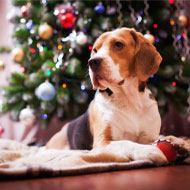German shelters ban Christmas pet adoptions

Those against the ban argue that Christmas can be a good time to introduce an animal to the home.
Dog shelters in Germany have instilled a temporary ban on adoptions over the festive period to reduce the number of unwanted animals being returned.
According to a report by BBC News, rehoming centres from across the country have told people that no animals will be available for adoption in the lead-up to Christmas.
Among them includes a shelter in Berlin, which says “Animals are living beings with needs and feelings. They are not suitable as surprise gifts.” Another centre in Bremen said that none of its 500 animals will be re-homed after the 18 December.
Supporters of the ban say that pets are often bought in impulse at the last second. Claudia Hämmerling from Berlin’s animal protection association told BBC News: "The decision to keep an animal must not be taken lightly - the whole family must be involved in the decision-making process”.
But those against the ban argue that Christmas can be a good time to introduce an animal to the home.
Animal charity RSPCA told the BBC that the extra noise and activity at Christmas “can make it difficult for any pet to settle into their new homes".
"However, for some people, the festive period is a calm, quiet time and may well be a good opportunity to introduce an animal into the home as families tend to be around the house with more time to spend with them," it says.
The report adds that most centres will remain open for viewings, but potential pet owners will have to return in January once they’ve considered and researched their decision.



 The latest
The latest